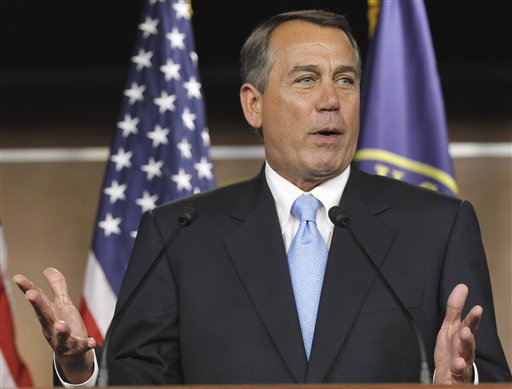House Speaker John Boehner said Friday the House may go to court to defend the federal law against gay marriage, which President Barack Obama’s administration has concluded is unconstitutional.
Boehner said he would convene a group of bipartisan congressional leaders that has the authority to instruct the House counsel to represent the chamber in court. The panel would include Boehner, Majority Leader Eric Cantor, R-Va.; Majority Whip Kevin McCarthy, R-Calif.; Minority Leader Nancy Pelosi D-Calif., and Minority Whip Steny Hoyer, D-Md.
“The constitutionality of this law should be determined by the courts — not by the president unilaterally,” the Ohio Republican said in a statement. “This action by the House will ensure the matter is addressed in a manner consistent with our Constitution.”
The Obama administration last month announced it would no longer defend the constitutionality of the federal law that bans recognition of gay marriage. Attorney General Eric Holder said the section of the 1996 law defining marriage as a union between a man and a woman is unconstitutional. Nonetheless, he said the Justice Department would continue to enforce the Defense of Marriage Act, and it remains in effect.
Boehner said he was convening the panel of House leaders “for the purpose of initiating action by the House to defend this law.” But there was no immediate indication of specifically what action it would direct or when the group would meet.
Democrats on the panel were unlikely to support any defense of the law. Pelosi has lauded Obama’s decision to stop defending it as a “victory for civil rights, fairness and equality.”
On Friday, she criticized the move as a costly burden on House staff.
“This is nothing more than a distraction from our most pressing challenges” such as creating jobs and reducing the federal deficit, she said.
The White House declined to comment on Boehner’s announcement.
The law’s supporters lauded the new House speaker, saying constitutionality should be decided by the courts and not by the president.
“With the House intervening, we will finally get lawyers in that courtroom who are trying to win this” issue, said Brian Brown, president of the National Organization for Marriage.
The law’s opponents said Boehner’s action amounted to pandering to the GOP’s conservative base at the expense of gays and lesbians.
House Republicans have “now shown they’re more interested in scoring cheap political points on the backs of same-sex couples than tackling real problems,” said Human Rights Campaign President Joe Solmonese.
Passed by the Republican-led Congress and signed into law by President Bill Clinton in 1996, the law defines marriage as a union between a man and a woman, prevents the federal government from recognizing gay marriages and allows states to deny recognition of same-sex unions performed elsewhere.
It’s been used by federal officials to justify excluding gay couples from a range of benefits available to heterosexual couples. They include health, Social Security, pension and tax benefits, even to gay couples who were legally married in the handful of states that recognize same-sex unions.
The Government Accountability Office estimates that there are more than 1,000 provisions of federal law “in which benefits, rights and privileges are contingent on marital status or in which marital status is a factor.”
Gay marriage is legal in some states: Connecticut, Iowa, Massachusetts, New Hampshire, Vermont and the District of Columbia. Still other states recognize civil unions, but not marriage, between partners of the same sex. California’s Proposition 8 has been ruled unconstitutional by a federal court.
Meanwhile, 30 states have constitutional amendments banning gay marriage.
Last year, U.S. District Judge Joseph Tauro ruled the law unconstitutional in the face of challenges by same-sex couples and the state of Massachusetts. Two new federal lawsuits in Connecticut and New York raise many of the same issues.
The Supreme Court has not ruled on the gay marriage ban and has turned down appeals asking it to weigh in. Those appeals were filed after lower courts upheld the law. The high court often hears appeals when a federal law has been struck down.
There is no timetable for when the next case involving the law will reach the Supreme Court.


